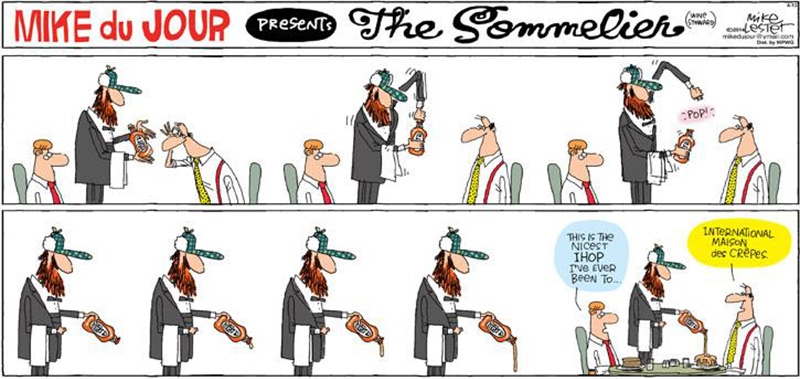If we live in any age at the moment, it’s the Age of Solutionism.
There seems to be a never-ending supply of guys (always guys) who believe that for anything in existence, surely a technological solution (usually an app) can be created that will do it better, disrupt whatever it is doing or maybe save the world. Of course, these boastful sales pitches usually just devolve into invading the privacy of your home by nabbing the floor plan from your robot vacuum, stealing all your info when you just want to stay in contact with your mom, or very boring things, like advertising. Those that are successful are hardly revolutionary.
There are two secrets to the success of these solutions whenever they do succeed and by “succeed” I mean, stick around for an IPO or an acquisition by a legacy company. The first is a leader who can drive the project. The second is having so much money behind them that they can keep burning through it until “dominant” although never actually “fiscally solvent”. It doesn’t really matter how good or bad the concept is because as long as you’ve got these as your foundation, you’re all set.
It seems that as many solutions there are to be dreamt up, there are people out there, able to get money to try and bring these unneeded creations to life, no matter how often said people fail in this pursuit.
In case you needed additional proof of this, look no further than the implosion of Pix at the end of August. Apparently, it “…just didn’t have enough runway” meaning, not enough financial backing, despite already having two rounds of funding during its short existence and being in the process of looking for a third.
It also suffered from being led by a CEO who has seen this be either his second or third failed startup depending upon how you count. It’s been kept very quiet as to where the source of the money has come from, but even if from questionable entities that they’d rather not mention, it’s a testament to the CEO’s only actual ability of having convinced people to give it to him, more than once.
In an amusing email from a curious fellow named Bob Henry who sends out a newsletter of sorts, he commented on the fact that for this CEO, “the ‘proof of concept’ supporting his vision of viable online wine selling is always 5 years away.” and note that in five years, it will be yet another five years away.
Oh, it searches too?
There have been a great many eulogies posted on the social medias since its demise as no one likes seeing a publication go under and writers yet again, out of work. I’m very much in agreement with that aspect of all this. It’s a sad reality in the world of wine writing (or writing in general) and why so many have decided to strike out on their own as there are few other options.
I had more than a passing sense that most people were of the impression that Pix was only some form of online publication, when in fact that was just a small subset of the overall project called, The Drop. This was one of the few strategies by the company that was clear to see. They would start out by bringing eyeballs to the site via editorial that hired well-known writers who would then promote the articles they’d written for the site and in turn the Pix “brand”. It was a smart (albeit clearly unsustainable) move paying more than the going rate as it attracted a great many respected writers who were happy to tweet or push their pieces as anyone sensible would want that faucet to keep flowing.
This isn’t anything new however. As one commenter on Twitter pointed out, the British wine trade attempted this in the early 1990s. I witnessed it again in the early 2000s with dot-com startups. And then we’ve seen it again just over 10 years ago with such sites as Seven Fifty with their Seven Fifty Daily which has been pared back from its original editorial line to being nearly devoid of any original content, something I’d predicted back in 2018, but took a year or two longer than I’d originally thought. Who’d have ever thought that writing would become an addon marketing vehicle?
In fact, none of these enterprises panned out as publishing is a completely different business than anything it ever gets tacked on to. And in the case of Pix, if your core product isn’t ready for primetime, then the articles are going to get most of the attention and not really do you any good on the other side of things. That was never a good match and I’m surprised The Drop lasted as long as it did, but I suppose something had to distract while they were building the stuff.
What the stuff, or “solution” was, was a new search engine for wine that was proposed to be something of an Amazon or Netflix for wine in that it would help guide people towards their wine discoveries and then lead them to a place where they would buy the wines. Pix kept insisting that they would just forward people on to merchants and all would be free for the customer–a business model many were scratching their heads over.
The problem with all this is that an exceedingly robust search engine for wine already exists called, Wine Searcher. There is also the app, Vivino, but Wine Searcher is much more akin to what Pix was trying to emulate. And yes, it does have an editorial component tied to it but it works more as a tie-in to the data on the website with fewer articles in general.
Sure, people (some of which were in the employ of Pix) complained that the most useful aspects of Wine Searcher are only available to paying customers or that being listed as a wine merchant costs a fee. Criticizing that second part was in poor, hypocritical form as it was part of Pix’s grand scheme to do the same eventually. Also, Wine Searcher has been in existence and worked very well, for a very long time despite claims that it’s “not pretty” which unfortunately is all that seems to matter to some people now.
You can’t lead a horse to wine
Pix kept pushing that age-old conundrum that “wine is hard”. It is and there are countless variables behind each bottle that require a great deal of knowledge to have any idea what it all means and what wine you should buy. This made the idea that they could be a Netflix kind of recommendation system ludicrous given that movies all pretty much cost the same (and with a monthly subscription, they cost exactly the same) whereas wine varies vastly in terms of price.
It is however a common pitch by people and much is made about “demystifying wine”, which is why Ruth Spivey’s tweet was smashing:
“I am so sick of people saying their aim is to demystify wine, I’m going to spend the rest of my days making it as complicated and intimidating as possible. Who’s in?”
Of course, solutionism would want to strike at the heart of the problem here and make it so that people can easily figure out what wines to drink. The only problem is that this will never work with any kind of Artificial Intelligence system. No, the reason isn’t because vintages and prices and moods and most everything about wine is in a constant state of flux.
It’s because there’s a case of Problem Exists Between Bottle and Drinker (PEBBAD is a riff on PEBKAC that only IT people will get) in that there are but a few types of people who drink wine and within those, there’s but one group who, if this system could possibly be built for, would ever use it.
Wine is Wine
These are your dependable winedrinkers because they’re brand loyal and just looking for a consistent drinking experience. They may be part of the “Anything But Chardonnay” group who will then down Chablis by the bucketload, but that’s okay. They enjoy wine because of its innate properties as an alcohol that pushes the right buttons for them. They find something they like, they stick with it, and they should be admired for that because they are in fact the people who keep the wine industry alive.
Any wine producer is very happy to have these customers as they’re exceptionally regular and they have no interest in discovering new brands or regions or grapes or whatever so some “discovery engine” may be something they try once but won’t care about later as they’ll just go back to their tried and true.
Cheap is Wine
I don’t know if any one country leads in this segment, but there are many drinkers who fall into this in both the US and UK as well as probably others. This might even be bigger than the “Wine is Wine” crowd as they’re people constantly looking for whatever is on sale and cheaper than cheap, no matter the brand, region, or producer, as price is their main or only criteria. Color is about the only thing they might care about in addition to price, but just maybe.
If you don’t believe me, keep in mind that the average price for a bottle of in the UK is just over £6 and, in the US, $14, but the actual wines are much cheaper as in the UK, nearly half is taxes and, in the US, it’s a massively inflated price due to the three-tiered distribution system. Cheap wine is all over because people buy it, I mean, you can even find 2€ wines or less in Spain without looking too hard.
I personally don’t agree with this premise (espousing to drink better but less wine if money is an issue), but it’s what drives a lot of people. What’s not going to drive them is an AI wine search engine unless it’s one that shows them where the cheapest wine is when they’re ready to buy it. Again, Wine Searcher already has some of this built in, but if your true calling in life is to build, winesfercheap.com, you will have a very ready audience, although I have no idea how you’d make any money in this segment that’s so tight on margins.
So right here, this probably covers something like 95% of the wine-buying market as honestly, it’s how most people buy wines. The proof of this is in how mega-brands have become extremely valuable in the US (aka Meiomi) or own-brand in the UK and how those averages prices show that the general public just won’t spend more than the bare price of making the wine.
Thus, we come to our last group.
Wine is Life
If you’re reading this article, you could very well fall into this group as it’s full of the people who want to experience everything about wine and explore it whatever it takes. That can be kicking back a spendy Napa, some unknown variety from Bolivia or looking for wines in places as disparate as an island of Croatia or Bali. This is a group of people who check “All of the Above” when it comes to wine.
I’m one of those rare types who started out more or less in the Wine is Wine group back in university but moved to this group as these are the people I like to associate with.
We may not be consistently brand loyal (although we will return to top-kit wines often), but will spend much more money on good wines. The problem is that we’re really a small portion of the wine scene because it takes a lot of work to find wines and explore. It would seem that this is a group primed for some AI system to help find even more wines and save time in the search.
Here’s the rub though: this personal search and quest is all part of the fun.
I want some website to recommend a wine to me like I want Jeff Bezos knowing that I need to run the Roomba twice around the dog bed or Mark Zuckerberg reading my text messages about a parcel delivery coming to the house.
The recommendations would have to be so good that they would be better than what I see friends, fellow writers, and cavistes recommending and these recommendations would have to keep up with trends, vintages, tastes, flawed bottles, and who knows what else. There is no amount of money that can build a system like that right now and even if there was, I probably wouldn’t trust it for the same reason I don’t trust Jeff Bezos or Mark Zuckerberg (especially him) in that I just don’t want to be tracked and profiled by every single interaction I have online. For the love of Bacchus, let my wine just be wine.
Oh, and just because I spend more on wine, doesn’t mean that I’d ever pay for a service like Pix as surely a “premium” option for the public would have arrived had that “runway” not caught them by surprise. Again, part of the fun in being in this group of wine explorers is sharing knowledge with one another. Even in the depths of the pandemic that was still a warmer pursuit than any hot takes by the cold calculations of some AI.
And this is where we are. Even if Pix was having dump trucks driving up to their HQ with piles of gold bricks, they would have never, ever solved this core problem to make an intelligent “wine discovery” engine because such a thing only exists as the pitch of the solutionist, in an age of nothing actually being solved.
You’re reading a free article on Hudin.com.
Please consider subscribing to support independent journalism and get access to regional wine reports as well as insider information on the wine world.




